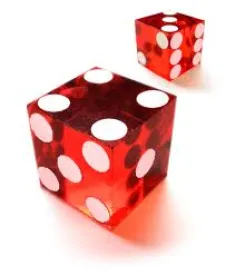In an opinion addressing patent-eligible subject matter and the printed matter doctrine, the US Court of Appeals for the Federal Circuit concluded that a particularly marked die set did not save the claims from patent ineligibility because the markings amounted to nothing more than printed matter. In re: Marco Guldenaar Holding B.V., Case No. 17-2465 (Fed. Cir. Dec. 28, 2018) (Chen, J) (Mayer, J, concurring).
Marco Guldenaar Holding’s application is directed to methods for playing a dice game including dice which only have particular faces marked. Marco argued that the primary novelty of the application was the marking (or lack thereof) on the dice. The examiner rejected the claims as being directed to patent-ineligible subject matter under 35 USC § 101, concluding that the claims were directed to the abstract idea of “rules for playing a game,” which falls within the realm of “methods of organizing human activities.” The Patent Trial and Appeal Board affirmed, and Marco appealed to the Federal Circuit.
The Federal Circuit affirmed, finding Marco’s claims to be directed to the rules for playing a dice game (an abstract idea), and finding that the recited steps were conventional and insufficient to limit the abstract idea to an inventive concept. Marco argued that the specifically claimed dice were unconventional, and that their recitation in the claims amounted to significantly more than the abstract idea. The Federal Circuit disagreed, explaining that the markings were more akin to the markings on a typical die or a deck of cards. Such limitations constitute printed matter outside the scope of § 101 because they are directed to the content of information and lack a requisite functional relationship. Each die’s markings (or lack thereof) communicated information to the players, but did not functionally relate to the substrate of the die itself—i.e., the markings did not provide the die itself with new functionality.
In a concurrence, Judge Mayer stated that he believes subject matter eligibility under § 101 is a pure question of law, which can and should be resolved at the earliest stages of litigation, and that claims directed to dice, card and board games can never meet the § 101 threshold because they endeavor to influence human behavior rather than effect technological change.




 />i
/>i

